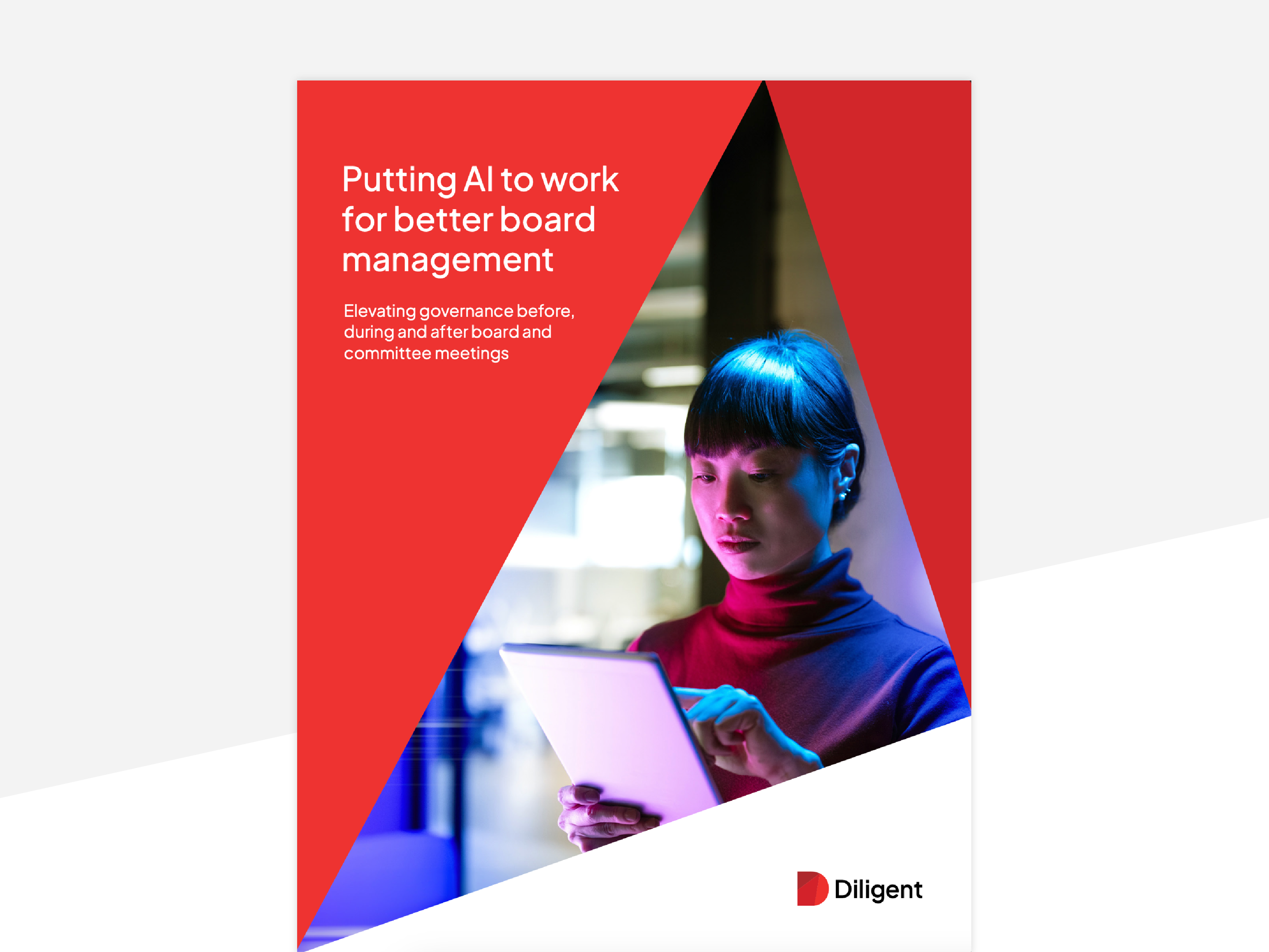AI risk perceptions among governance leaders

This article originally appeared in our September 11, 2025 edition of the Diligent Minute Newsletter. For more insights like these, delivered straight to your inbox, subscribe here.
Governance leaders feel more confident about AI these days, if the findings from our latest General Counsel Risk Index are any indication.
We asked GCs their key areas of risk right now, and only 8% mentioned technological disruption. This calm was a little surprising to me, given the current frenzy to integrate AI and see results as soon as possible.
AI risk perceptions among governance leaders
It all makes a recent episode of the Corporate Director Podcast particularly timely. We talked to Beena Ammanath, Global Head of the Deloitte AI Institute and a faculty member for Diligent’s AI Ethics and Board Oversight Program. Ammanath’s literally written the book — two, in fact — on navigating tech disruption, and I always find her take on things very thoughtful, nuanced and reassuring, as you’ll see in these expert tips for AI strategy and adoption.
1. Get real about workplace disruption
Sticking with our GC theme, the paralegals who support them have typically followed an established career path. Early on, they spend a lot of time looking up statutes and contracts and reviewing documents. The information they learn along the way equips them for more senior roles.
But now AI has automated the whole process, transforming the team’s workload and profession’s overall pipeline and career trajectory. It leaves paralegals understandably worried — especially when they hear promises that AI will take away the boring parts of their work and make their jobs easier.
“Leaders have a responsibility to go beyond the clichés,” Ammanath said. “What happens to the workday when organizations make the job easier? If AI is going to create new jobs, what are those roles?”
“I think leaders have a huge responsibility to proactively think about that,” Ammanath said, citing the need to create organizational structures for new career paths and provide both targeted upskilling and general AI training to build fluency across the workforce.
2. Find the ideal division of labor
Then there’s the matter of the human/machine relationship. “How can leaders thrive and succeed in this era of AI where humans and machines are working so closely together?” Ammanath asked. “To work in the best possible way, where can we get the maximum benefit with the minimum side effects?”
We’ve all seen cautionary tales about students outsourcing the entirety of their coursework to ChatGPT. This should go without saying but: Don’t do that in your organization.
In the podcast, my cohost Meghan Day and I talked about studies of what people’s brain waves look like when they use AI at different levels. The heaviest AI use showed the lowest brain function — almost like people were asleep. More optimal EKG activity happened when AI users started a task with their brains and then added ChatGPT.
“Personally, I’ve been most successful embracing AI in my job in areas where I already know what good looks like,” Day said. “And AI is able to speed my work along.”
AI also promises big potential for board members. You can train different agents to have different personalities and perspectives so they can frame problems in new ways for you, for example. But you’ll still need to oversee them and evaluate their output with your own human expertise to ensure accuracy and nuance.
3. Make continuous education — and hands-on use — a cultural norm
Navigating AI’s risks and rewards requires knowledge of AI itself.
This doesn’t mean dropping everything to become an AI expert (although those nine-figure job offers make it tempting). It means having a basic understanding of core AI principles, like machine learning, deep learning and computer vision — and what these principles look like in action.
“As corporate directors, it's important to focus the time and energy to not only learn about AI, but start using AI tools in your job,” Ammanath said.
AI is changing the way we work and the way we lead. For practical strategies and insights from Beena Ammanath, listen to the full conversation on the Corporate Director Podcast: AI leadership strategies for a changing world.
Keep exploring

AI leadership strategies for a changing world
This episode of the Corporate Director Podcast features Beena Ammanath, Global Head of Deloitte's AI Institute.

AI-powered risk management: The future of internal audit
Learn how AI is revolutionizing risk assessment in internal audits by streamlining processes, promoting cross-functional collaboration, and empowering auditors with data-driven insights for better decision-making.

AI for smarter board management
See how AI is transforming corporate governance. Learn how to automate tasks, enhance compliance and make data-driven board decisions. Download now.